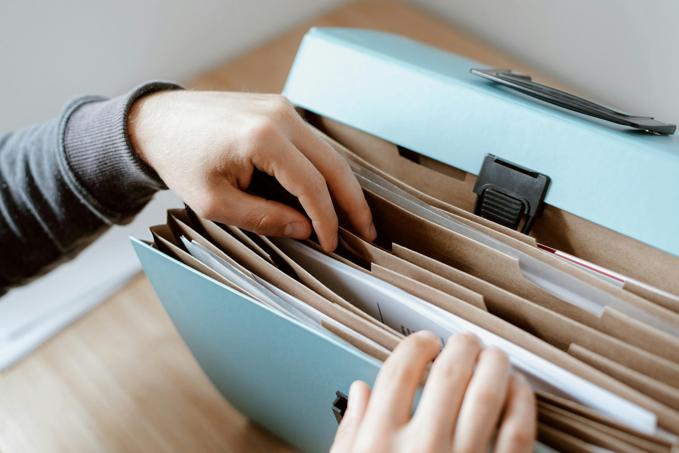Thursday, January 16, 2025 11:03 am, Posted by Absolute Destruction

Sensitive documents and devices can’t be thrown into a garbage bin like any old piece of trash. These need to be disposed of carefully in order to maintain data security, comply with privacy laws and prevent information from getting into the wrong hands. Without a level of extreme diligence, you could risk disastrous situations like major data breaches or identity theft.
Here at Absolute Destruction, we offer reliable document and data destruction for companies across Southwestern Ontario. We understand the importance of thoroughly eradicating sensitive documents and the consequences of making common disposal mistakes.
What are some disposal mistakes you should avoid?
1. Not Shredding Sensitive Documents Completely
An all-too-common mistake that people make is that they don’t shred sensitive documents properly. They tear the paper into a few pieces. Or they use scissors to cut the document into neat strips and then throw them into the recycling bin.
When you only tear or cut the documents apart, you’re creating a security risk. These pieces can be puzzled back together, which means any private information on those papers can be read again.
If the wrong person puzzles that paper back together, they could access some highly sensitive information. For instance, if you were destroying tax records and made this mistake, someone could potentially access personal identification and financial information on the records. This could allow them to commit a serious crime like identity theft and financial fraud.
You need to make sure that documents are so shredded that they cannot be easily put back together again. A cross-cut or micro-shredder can be useful for a small number of sensitive documents. If you have a large number of documents to get rid of, Absolute Destruction can help. We will shred them to a size where reconstruction is not possible.
2. Throwing Sensitive Documents in the Trash
Sensitive documents don’t belong in your regular trash bin. And they don’t belong in your regular recycling bin, either. Trash bins, recycling bins and dumpsters can be pilfered, which means the information on those documents could get into the wrong hands.
If you’re hoping to do a safe disposal of personal documents, you’re going to need to put them in disposal bins designed for this specific purpose. These will be locked so that they are secured from any potential data thieves. These secured bins will then be transported for recycling.
We offer these types of bins as a part of our shredding services.
3. Recycling E-Waste Without Addressing Data Storage
Another mistake is trying to dispose of electronic waste like old computers, tablets and smartphones without considering the data stored on them. If the e-waste isn’t destroyed, then it can be used again and the data on it can be accessed.
E-waste can contain loads of sensitive information, like login credentials, password lists, confidential work emails and financial records. On a small scale, this access to information could lead to individual cases of identity theft. On a larger scale, it could lead to massive company-wide cybersecurity breaches.
What about deleting the data or doing a factory reset? That may not be enough. Even a reset device can retain data that can be obtained by hackers. So, an in-tact device is vulnerable. Physically destroying a flash drive so that it is completely inaccessible is the best way to prevent anyone from spotting the data on it. Browse our website to find out how to fully destroy your electronics. You can find out how to destroy old cell phones, flash drives and more.
We can help you completely destroy whatever e-waste you need to dispose of, including desktop computers, laptops, smartphones, USBs and data disks.
4. Ignoring Compliance Requirements
There are industry-specific regulations when it comes to disposing of sensitive material. For instance, healthcare providers need to comply with the Personal Health Information and Protection Act so that personal health information does not get exposed.
If you fail to account for these specific regulations, you might face legal recourse for this mistake. You could also sully the reputation of your company. Your clients might lose their trust in your organization for allowing data to be released in this way.
How can you avoid this monumental mistake? First, get familiar with the regulations that apply to your company and industry. Then, when you need to have your sensitive documents destroyed, go to a certified shredding and data destruction service for help.
We will help you comply with these regulations and dispose of documents safely.

5. Delaying the Disposal of Sensitive Items
The longer a sensitive document or device is sitting around, the more vulnerable it is to data exposure. When you procrastinate on purging unnecessary sensitive documents or e-waste, you increase the risk of intrusion and theft. Don’t let these things gather dust in filing cabinets or cardboard boxes. If you don’t need them anymore, take action and get rid of them!
Get in the habit of going through your sensitive materials at least once a year. You can decide which materials can stay and which materials need to be eliminated thoroughly. Any materials that you decide to keep should be stored in a secure space. As for the materials that need to be destroyed, hire professional disposal services to get rid of them.
When it comes to the disposal of sensitive documents and devices, you don’t want to make a mistake. When sensitive information gets into the wrong hands, it could lead to monumental problems. A data thief could steal someone’s personal information to commit identity theft, or hackers could access a company’s customer accounts. These are not easy situations to recover from.
It's crucial that you don’t treat your documents and devices like regular pieces of garbage. These are not pop cans that can go into a blue recycling bin or plastic wrappers that can be tossed in the trash. These need to be thoroughly secured, destroyed and disposed of. Absolute Destruction can do all of this for you.

